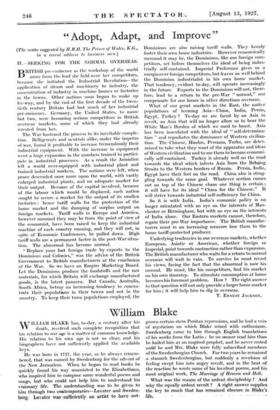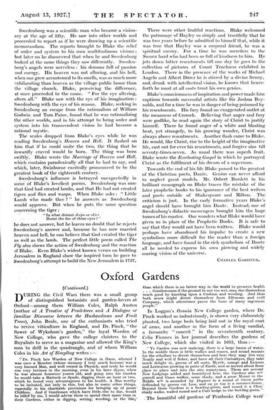William Blake
w1LLIAM BLAKE has, to-day, a century after his death, received such complete recognition that his relation to our age is a matter of common knowledge. His relation to his own age is not so clear, and his biographers have not sufficiently applied the available keys.
He was born in 1757, the -year, as he always remem- bered, that was named by Swedenborg for the advent of the New Jerusalem. When he began to read books he quickly found his way unassisted to the Elizabethans, who inspired him to compose some wonderful poems and songs, but who could not help him to understand his visionary The understanding was to be given to him through two cotemporaries—Lavater and Sweden- borg. Lavater was sufficiently. an artist to- have out- grown certain stern Puritan repressions, and he had a vein of mysticism on which Blake seized with enthusiasm. Swedenborg came to him through English translations of his works from the Latin ; he no sooner read- him than he laded him as an inspired prophet, and he never rested until he and Mrs. Blake were fully subscribed members of the Swedenborgian Church. For two years he remained a staunch. Swedenborgian, but suddenly a revulsion of feeling swept him into angry revolt, and in the heat of the reaction he wrote some of his loveliest poems, and his most original work, The Marriage of Heaven and Hell.
What was the reason of the ardent discipleship ? And why the equally ardent revolt ? A right answer supplies the key to much that has remained obscure in Blake's life. • - Swedenborg was a scientific man who became a vision- ary at the age of fifty. He saw into other worlds and proceeded to report as if he were drawing up a scientific memorandum. The reports brought to Blake the relief of order and system to his own multitudinous visions ; but later on ,he discovered that when he and Swedenborg looked at the same things they saw differently. Sweden- borg's angels were nerveless : his demons full of passion and energy. His heaven was not alluring, and his hell, when one grew, accustomed to its smells, was as much more exhilarating than heaven as the village public house than the village church. Blake, perceiving the difference, at once proceeded to the cause. " For the eye altering, alters all." Blake saw with the eye of his imagination : Swedenborg with the. eye of his reason. Blake, seeking in Swedenborg an escape from the rationalism of William Godwin and Tom Paine, found that he was rationalizing the other worlds, and in his attempt to bring order and syStern into his transcendent vision he lad become a rational mYstic.
The scales dropped from Blake's eyes while he was reading SWedenborg's Heaven and Hell, It flashed on hini that if he could unite the two, the thing that he inwardly. craved- would be born. -The thing was born swiftly. Elake wrote the Marriage of Heaven and Hell, contains paradoxically all that lie had to say, and which;, later, SWinburne excitedly pronounced to be the greatest book of the eighteenth century. . .
Swedenborg's influence is .betrayed unexpectedly in some of Blake's loveliest poems. Swedenborg was sure that God had created lambs, and that He had not created tigers and flies and wasps. When Blake asks : " Little Lamb who made thee ? " he answers as Swedenborg would approve. 'Fa when he puts, the same question concerning the tiger • • • "la what distal:it'd:T-22s or skies Burnt-the fire of'thine.eyett " he does not -answer, but he leaves no doubt that he rejects Swedenborg's answer and, because lie has now- married heaven and hell, he can believe that God created the tiger as well as the lamb. The perfect little poem called The Fly also shows the action of Swedenborg and the reaction of Blake. Even-Blake's widest known verses on building Jerusalem in England -show the inspired turn he gave to Swedenborg's attempt to build the New Jerusalem in 1757. There were other fruitful reactions. Blake welcomed the patronage of Hayley so simply and trustfully that lie was two years before he admitted to himself that, while it was true that Hayley was a corporal friend, he was a spiritual enemy. For a time lie was merciless to the Sussex bard who had been so full of kindness to him. He jots down bitter resentments till one day lie goes to the collection of pictures of Count Truchsess exhibited in London. There in the presence of the works of Michael Angelo and Albert Diirer he is stirred by a divine frenzy, and, drunk with intellectual vision, lie knows that hence-, forth he must at all costs trust his own genius.
Blake's consciousness of inspiration and power made him captious towards successful artists like Sir Joshua Rey- nolds, and for a time he was in danger of being poisoned by his resentments. His fury found an exaggerated outlet at the meanness of Cromek. Believing that anger and fury were godlike, he read again the story of Christ to justify himself. There he found anger of a white and blasting heat, yet strangely, to his growing wonder, Christ. was always above resentments. Another flash came to Blake. He would, like Christ, rise to the height of the imaginative life, cast out for ever his resentments, and forgive sins till seventy-times-seven. As usual there was superb fruit. Blake wrote the Everlasting Gospel in which he portrayed Christ as the fulfilment of his- dream of a superman.
Towards the end of leis life Blake passed to the greatest of the Christian poets, Dante. Genius can never afford to neglect great models. Mr. Osbert Burdett in his brilliant monograph on Blake traces the mistake of the later prophetic books to his ignorance of the best writers and . poets outside of Shakespeare and Milton. _ The criticism is just. In the early formative years Blake's angel should have brought him Dante. Instead, one of Swedenborg's didactic messengers brought him the. huge. tomes of his master. One wonders what Blake would have given us in place of the Prophetic Books. It is safe to say that they would not have been written. Blake would perhaps have abandoned his impulse to create a new symbolism- more difficult for the reader than a foreign language, and have found in the rich symbolism of Dante all he needed to express his own piercing and widely soaring vision of the universe.
CHARLES GARDNER.































 Previous page
Previous page